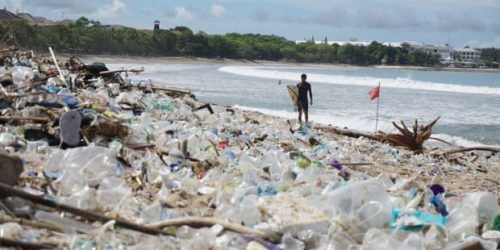Bali’s famous beaches are being strewn by plastic rubbish in what experts say is becoming an annual event thanks to monsoon weather, poor waste management and a global marine pollution crisis.
Authorities are struggling to keep up with the tide of rubbish washing up on beaches at Kuta, Legian and Seminyak, where about 90 tonnes of rubbish was collected on Friday and Saturday.
Wayan Puja, from the Badung area’s environment and sanitation agency, said: “We have been working really hard to clean up the beaches, however the trash keeps coming. Every day we deploy our personnel, trucks and loaders.”
He said more than 30 tonnes of rubbish was removed on Friday from beaches in Kuta, Legian and Seminyak and the amount doubled to 60 tonnes on Saturday.
The Indonesian government launched a national strategy in April 2020 to combat the “looming crisis” of plastic waste that was affecting the country’s marine environment and economy.
Dr Denise Hardesty, a principal research scientist at Australia’s CSIRO science agency and an expert on global plastic pollution, said there was a “tremendous amount” of plastic currently being collected from the beaches and it was getting worse each year.
“It’s not new and it’s not surprising and it happens every year, and it’s been growing over the last decade,” said Dr Denise Hardesty, a principal research scientist at Australia’s CSIRO science agency and an expert on global plastic pollution.
Hardesty has worked with marine pollution researchers in Indonesia and is one of the experts working with the Indonesia government on its action plan.
The rubbish had likely not travelled far, she said, and there would be many other beaches on the Indonesian archipelago suffering a similar fate.
Bali’s beaches in the southwest tended to catch rubbish when monsoonal rains and winds blow each year from west to east.
But Hardesty said the increasing amount of plastic washing up was in line with the global rise in the production of plastic.
Beaches around the globe were seeing an increase in waste, “but in monsoonal countries we do find a much stronger seasonal affect.”Advertisement
Hardesty said community groups and individuals were becoming more active in trying to cut the use of plastics and there was a suite of approaches being used to tackle the problem.
Dr Gede Hendrawan, the head of the centre for remote sensing and ocean sciences at Bali’s Udayana University, said a major problem was Indonesia’s ineffective rubbish handling systems.
“The biggest problem is actually the trash handling hasn’t been effective in Indonesia. Bali has just started to reorganise it, also Java has just started,” he said.
Bali’s governor, Wayan Koster, urged serious action to clean up the beaches which are a huge tourist drawcard.
More than a million Australians visit Bali every year, and the island is also popular with Chinese visitors.
“The Badung administration should have a trash handling system at Kuta Beach that is complete with adequate equipment and human resources so they can work quickly to clean up the trash washed onto the beach,” the governor said.
“Moreover, in the rainy season when there are tourists visiting, the trash handling systems should be working 24 hours a day. Don’t wait for tomorrow.”
Thousands of tourists would normally be in Bali at this time of year, but the coronavirus pandemic has halted overseas travel and there are few visitors.
Indonesia has also closed its borders to all foreign arrivals for two weeks from 1 January in a bid to halt the spread of the new strains of Covid-19.
Bali’s economy has been hit hard by the pandemic which has decimated its tourist industry with only domestic arrivals.





